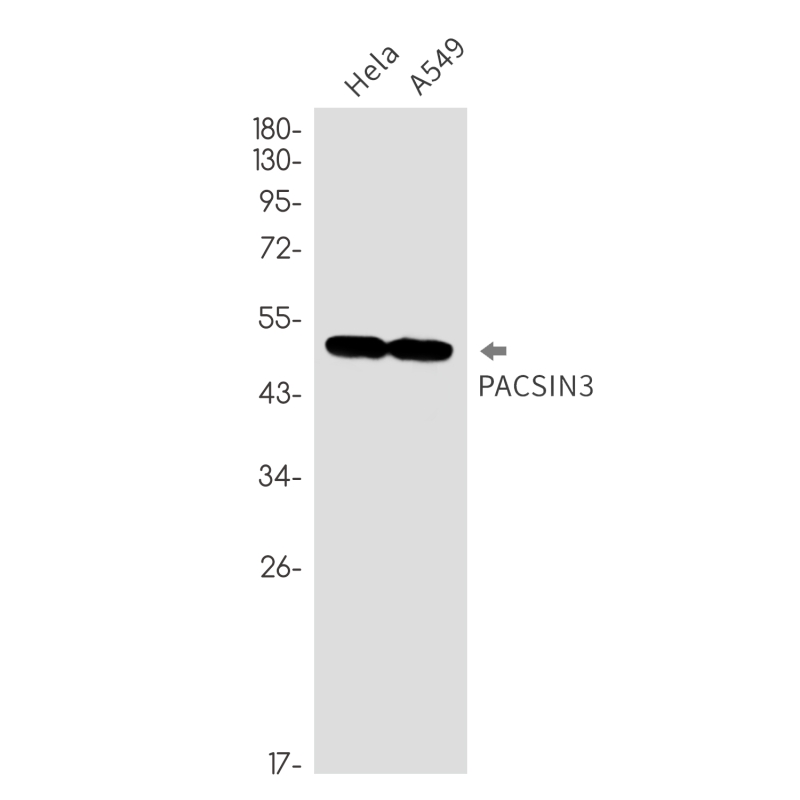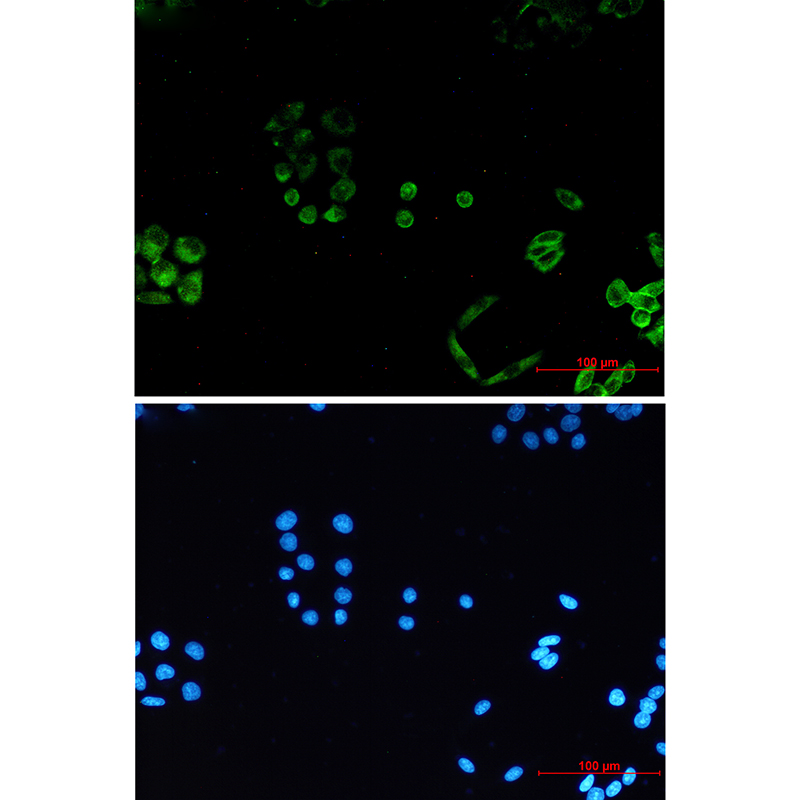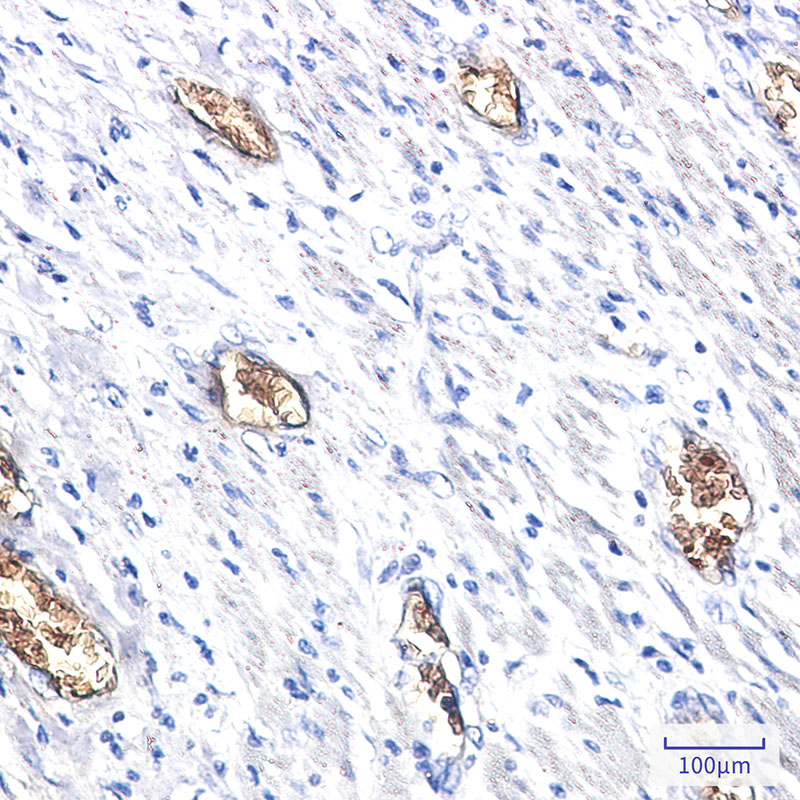


| WB | 1/500-1/1000 | Human,Mouse,Rat |
| IF | 1/20 | Human,Mouse,Rat |
| IHC | 1/50-1/100 | Human,Mouse,Rat |
| ICC | 1/50-1/200 | Human,Mouse,Rat |
| FCM | 咨询技术 | Human,Mouse,Rat |
| Elisa | 咨询技术 | Human,Mouse,Rat |
| Aliases | SDPIII |
| Entrez GeneID | 29763 |
| WB Predicted band size | Calculated MW: 48 kDa; Observed MW: 48 kDa |
| Host/Isotype | Rabbit IgG |
| Antibody Type | Primary antibody |
| Storage | Store at 4°C short term. Aliquot and store at -20°C long term. Avoid freeze/thaw cycles. |
| Species Reactivity | Human |
| Immunogen | A synthetic peptide of human PACSIN3 |
| Formulation | Purified antibody in TBS with 0.05% sodium azide,0.05%BSA and 50% glycerol. |
+ +
以下是3篇与PACSIN3抗体相关的代表性文献(注:以下内容为示例性概括,实际文献需通过学术数据库核实):
---
1. **文献名称**: "PACSIN3 regulates cell migration through interaction with syndapin in breast cancer cells"
**作者**: Lee, J. et al.
**摘要**: 本研究利用PACSIN3特异性抗体进行免疫共沉淀和Western blot分析,发现PACSIN3通过与Syndapin蛋白相互作用调控乳腺癌细胞的肌动蛋白重塑,影响细胞迁移能力。
2. **文献名称**: "The role of PACSIN3 in neuronal vesicle trafficking revealed by CRISPR-Cas9 knockdown"
**作者**: Zhang, R. & Müller, S.
**摘要**: 通过CRISPR-Cas9敲低PACSIN3并结合免疫荧光(使用PACSIN3抗体定位蛋白),证实PACSIN3参与神经元突触囊泡运输,影响神经信号传导。
3. **文献名称**: "Proteomic analysis of PACSIN3-associated complexes in endothelial cells"
**作者**: Gupta, A. et al.
**摘要**: 采用PACSIN3抗体进行免疫沉淀-质谱联用技术,鉴定了内皮细胞中与PACSIN3相互作用的蛋白质网络,提示其在血管生成中的潜在调控机制。
---
**建议**:如需实际文献,可通过PubMed或Google Scholar搜索关键词“PACSIN3 antibody” + “Western blot/immunoprecipitation/function”筛选近年研究,并优先选择高影响力期刊(如*Journal of Cell Biology*或*Molecular Biology of the Cell*)。
The PACSIN3 (Protein Kinase C and Casein Kinase Substrate in Neurons 3) antibody is a research tool used to detect and study the PACSIN3 protein, also known as syndapin III. PACSIN3 belongs to the PACSIN/Syndapin family of scaffolding proteins involved in membrane dynamics, cytoskeletal organization, and intracellular trafficking. It interacts with key proteins like dynamin, WASP, and microtubules, playing roles in vesicle formation, endocytosis, and receptor signaling.
PACSIN3 is ubiquitously expressed but particularly abundant in the brain, kidney, and immune cells. Dysregulation of PACSIN3 has been linked to neurological disorders, cancer progression, and metabolic diseases. For example, it modulates EGFR trafficking in cancer cells and regulates glucose uptake in adipocytes.
Antibodies targeting PACSIN3 enable researchers to investigate its expression, localization, and function via techniques like Western blotting (WB), immunofluorescence (IF), and immunohistochemistry (IHC). These antibodies are typically raised in hosts like rabbits or mice, with validation in human, mouse, and rat samples. Specificity is confirmed using knockout controls or siRNA knockdown.
Understanding PACSIN3's mechanisms through antibody-based studies contributes to insights into cellular physiology and disease pathways, potentially aiding therapeutic development. Its role in membrane remodeling and signaling makes it a critical focus in cell biology research.
×